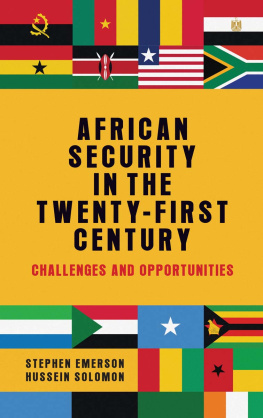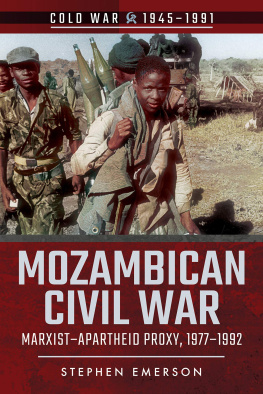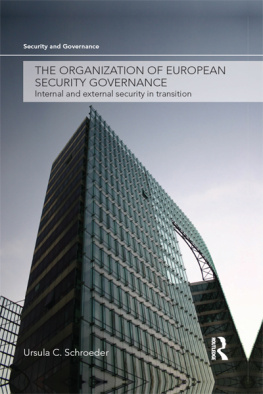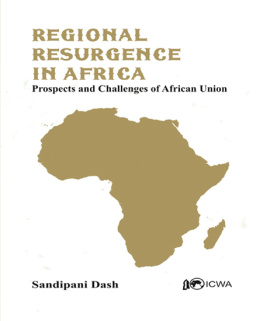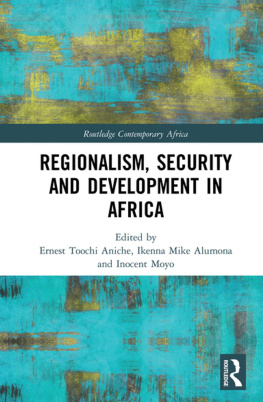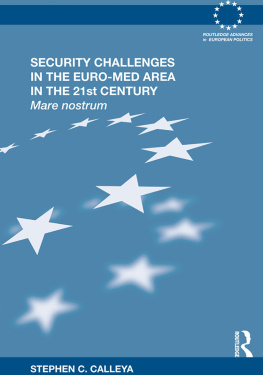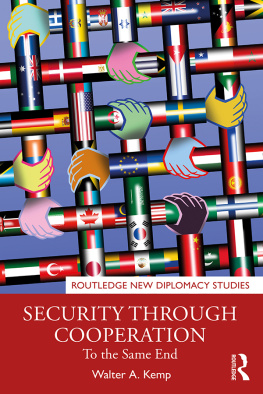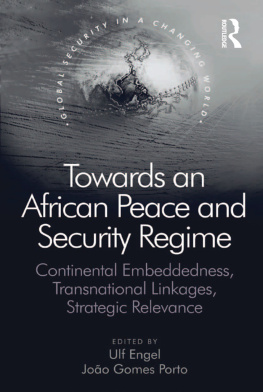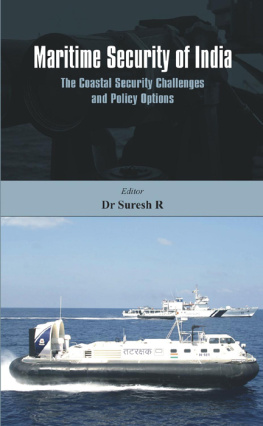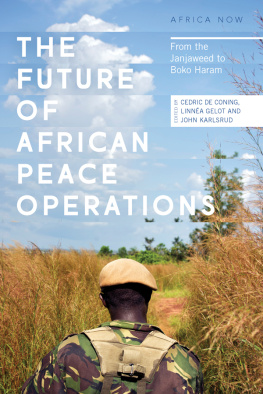Copyright Stephen Emerson and Hussein Solomon 2018
The right of Stephen Emerson and Hussein Solomon to be identified as the authors of this work has been asserted by them in accordance with the Copyright, Designs and Patents Act 1988.
Published by Manchester University Press
Altrincham Street, Manchester M1 7JA
www.manchesteruniversitypress.co.uk
British Library Cataloguing-in-Publication Data
A catalogue record for this book is available from the British Library
ISBN 978 1 5261 2273 5 hardback
First published 2018
The publisher has no responsibility for the persistence or accuracy of URLs for any external or third-party internet websites referred to in this book, and does not guarantee that any content on such websites is, or will remain, accurate or appropriate.
Typeset in Sabon and Gill by
Servis Filmsetting Ltd, Stockport, Cheshire
This is a book about African security and, as such, it examines and analyzes the nature of the current environment, as well as the key challenges and opportunities facing the entire continent. This, by definition, includes the five countriesAlgeria, Egypt, Libya, Morocco, and Tunisiathat comprise North Africa. The reasoning goes beyond simply geographic correctness. While these five countries do share common political, cultural, and historical links to the Arab Middle East, they also share powerful linkages to their sub-Saharan African brethren. In the past, the primary emphasis was on longstanding economic, political, and social links: think of the pre-colonial trans-Saharan caravan trade, ideological support for the anti-colonial liberation struggle, or the importance of the Nile River as the lifeblood of Egyptian society. Security, however, is one link that has come rushing to the fore in the new century, and the security of North Africa and its people is now, more than ever, tied to the security challenges of the wider continent.
Moreover, the African security challenge now transcends national and sub-regional borders across all of the continent and thus to rely on artificially drawn and outdated conceptual boundaries of an Arab North Africa and a black sub-Saharan Africa that separate the two and their shared challenges is to deny this twenty-first-century reality.
There is a growing acceptance and acknowledgement of this reality. The United States creation of Africa Command in 2007 brought together for the first time all the countries of Africa (with the exception of Egypt) under a single organizational structure for implementing American military policy and for providing security assistance. International organizations working in Africa now routinely view the security implications of crime, drug and arms trafficking, disease, migration, and refugee flows from a continental perspective. With Moroccos rejoining of the African Union in January 2017 after a 33-year absence, all of the continents sovereign nations will be represented in the forum. Likewise, the North African bloc comprises one of the African Unions five sub-regional structures for advancing economic and security cooperation. Interregional cooperation on matters of instability and the rise of terrorism and extremism has also boosted political and security ties across the pan-Sahel between both North and sub-Saharan African countries.
This does not mean one should treat the entire continent as a monolithic block, because it is not. Africa, as we shall see, is a highly diverse place with various countries and sub-regions facing a broad spectrum of threats and challenges. All threats and challenges are not the same across the continent. Some of theseidentity conflict, poverty, underdevelopment, disease, and environmental degradationare more widespread and endemic than others, which tend to be clustered into self-delineating zones of conflict and violence. Some are rooted in a very specific historical and socio-economic context that increases their intensity and significance. Others pose more of a threat because of globalization and the fragile nature of the modern state. Many are often highly complex and intertwined with other challenges that further muddle the waters. But all ultimately affect the continents overall security and stability that in turns helps shape Africas impact on the global security environment.
The authors employ a human security approach to not only examine and analyze these challenges, but also to assess the effectiveness of solutions and progress so far in addressing these challenges. This approach is critical to understanding the true meaning and context of security in Africa by asking questions such as: security for whom and security for what? For in the Africa of today, security is more about advancing freedom of fear and freedom of want by empowering individuals and communities and having truly accountable governments. Importantly, this mandate calls for moving beyond ruling regimes and militaries as the sole arbitrators of security by calling for a more inclusive societal approach to building security.
While the critics of the human security approach may deem it overly broad in its definition and too encompassing to be effectively used as a theoretical framework, we believe this perceived weakness is actually one of the approaches primary strengths. In blurring the traditional stark divide between security and development, human rights, and quality of life the notion of security becomes more relevant and policy prescriptive. This is especially important for Africa, where more conventional perspectives of security fall short in addressing the vast array of interdependent and non-traditional challengesranging from communal resource conflict, pandemic disease, and environmental degradation to transnational crime, terrorism and extremism, and failing statesfacing the continent and its people. Moreover, with its focus on securing individuals and communities first and foremost rather than regimes, state structures, and institutions, the human security model is a bottom-up approach to security that taps into a broader and more diverse collection of stakeholders, putting the onus of responsibility on Africans themselves for ultimately defining and addressing their own security needs.
In the pages that follow, this book looks at the key security challenges facing the continent now and in the coming decades. It does so in the context of Africas history, culture, and a still evolving security paradigm in an increasingly globalized world; all of which make the continent one of the most dynamic and difficult security environments. In doing so, this book seeks to challenge more traditional security constructs, which the authors deem as being woefully inadequate to meet the real security needs of African countries and their citizens.
In the concluding pages various ongoing and proposed solutions to these challenges at the local, regional, and international level are examined and assessed. All are works in progress. Still progress is being made, albeit not at the pace and extent that many in and outside of Africa had hoped to see, and much more work still needs to be done. What is telling, however, is the rising acknowledgement that Africa is not solely to be seen as a venue for problems or as an exporter of global security threats. For now is has truly become an integral part of the global solution to these challenges, working with fellow Africans and with international partners to establish its rightful place as a valuable contributor in building international security. It will be a long and difficult journey, but one that has finally begun.

